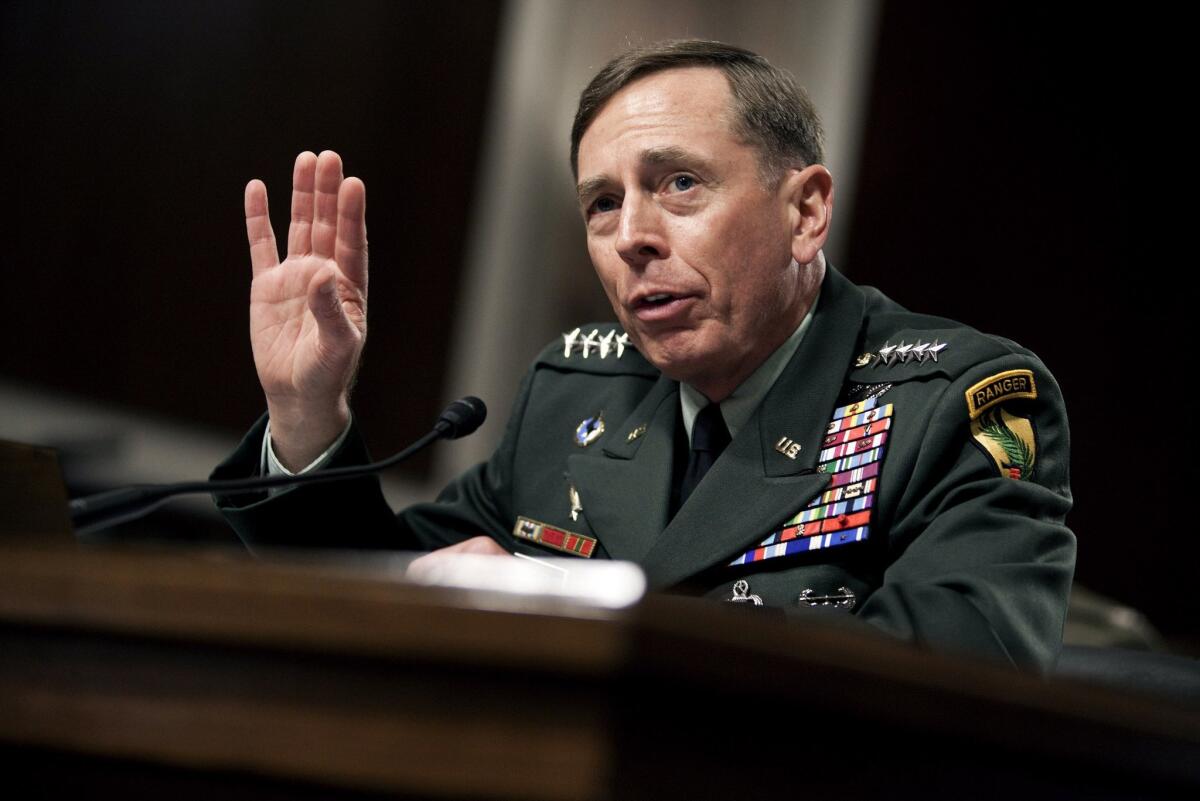David Petraeus pleads guilty to giving classified journals to mistress

- Share via
Reporting from Washington — David H. Petraeus, the former CIA director and retired four-star Army general, admitted Tuesday that he gave eight handwritten journals containing highly classified information about secret operations and identities of covert officers to his mistress in 2011 and then lied about it to the FBI.
Petraeus pleaded guilty to one misdemeanor count of retaining classified information. Prosecutors agreed not to charge him with more serious crimes, such as obstruction of justice and lying to the FBI, the Justice Department announced.
Petraeus agreed to pay a $40,000 fine, and prosecutors said they would recommend that he receive probation instead of prison time.
The plea marks perhaps the final chapter in the dramatic disgrace of a modern military hero, and raises questions whether the 62-year-old former officer was treated more leniently than others accused of improper disclosures of classified information.
As commander of multinational forces in Iraq in 2007 and 2008, Petraeus was largely credited with changing the course of the war through his embrace of an effort to win over Sunni Muslim militias to the U.S. side, which coincided with an infusion of additional U.S. troops. He later served as head of U.S. Central Command and head of coalition military forces in Afghanistan.
When he retired from the Army to take over the CIA in September 2011, Petraeus was widely praised as one of the country’s great military commanders and considered a possible candidate for president or other elective office one day.
Petraeus ran the CIA for only 14 months before he was forced to step down after admitting to an illicit affair with his biographer, Paula Broadwell.
The FBI had uncovered the affair while investigating allegedly threatening emails that Broadwell had sent to a Florida socialite who was friends with Petraeus and his wife.
Two weeks before the scandal broke, Petraeus was interviewed by two FBI agents, who said they were investigating allegations of security breaches. In that meeting, according to court documents released Tuesday, Petraeus told the agents he had never given classified information to Broadwell.
But according to court papers, Petraeus had given her 5-by-8-inch bound notebooks that contained notes from official and unofficial meetings and briefings while he was in Afghanistan.
The journals contained classified information regarding the identities of covert intelligence officers, war strategy, intelligence capabilities, diplomatic discussions, quotes from and deliberative discussions with high-level National Security Council meetings and Petraeus’ private meetings with President Obama, according to court documents.
Petraeus did not give the books to his official military historian, as required, but kept them in his home. On Aug. 4, 2011, a month before he took over the CIA, Broadwell asked, “By the way, where are your black books?” according to a recording she made while interviewing him, the court papers said.
Petraeus told her that they were “in a rucksack somewhere” but that the contents were “highly classified.”
“I mean there’s code word stuff in there,” he added, according to the court documents. Three weeks later, he drove them to Broadwell’s residence in Washington.
As a reserve officer at the time, Broadwell had a security clearance, though it is unclear whether she was cleared to view the material in Petraeus’ notebooks. The court documents say she did not divulge any secrets in the biography she later wrote.
Critics said Petraeus’ guilty plea further damaged a reputation tarnished by his marital infidelity and the short-lived nature of the security gains he was credited with achieving in Iraq, a country now torn by battles with Islamic State militants, and Afghanistan, where the Taliban is resurgent.
“The successes for which he was once hailed have proven transitory and incomplete,” said Andrew Bacevich, a retired Army officer and Boston University professor.
But Petraeus’ admirers said resolution of the criminal charges would allow him to begin rebuilding his career.
“I believe it is time to consider this matter closed,” Sen. John McCain (R-Ariz.), chairman of the Senate Armed Services Committee, said in a statement. “At a time of grave security challenges around the world, I hope that Gen. Petraeus will continue to provide his outstanding service and leadership to our nation, as he has throughout his distinguished career.”
Petraeus kept a low public profile while the case was under investigation. He took a job with a Wall Street investment firm and taught at several universities, including USC.
Twitter: @DavidCloudLAT
More to Read
Sign up for Essential California
The most important California stories and recommendations in your inbox every morning.
You may occasionally receive promotional content from the Los Angeles Times.















